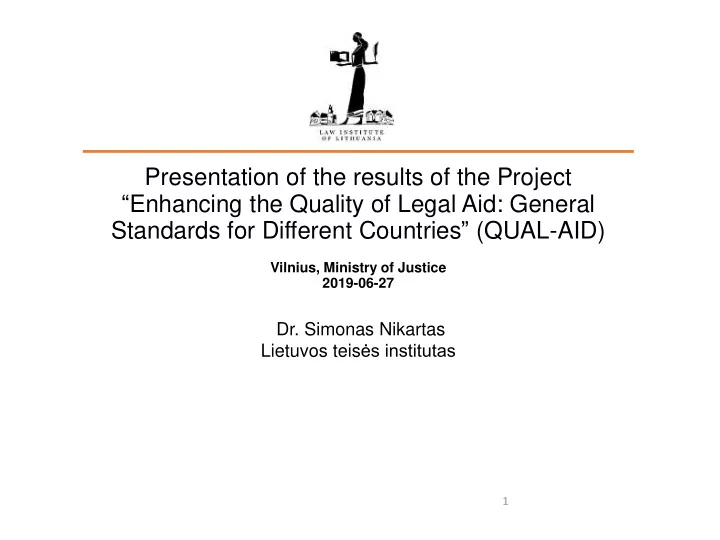

Presentation of the results of the Project “ Enhancing the Quality of Legal Aid: General Standards for Different Countries ” (QUAL-AID) Vilnius, Ministry of Justice 2019-06-27 Dr. Simonas Nikartas Lietuvos teis ės institutas 1
“Enhancing the Quality of Legal Aid: General Standards for Different Countries” (QUAL -AID) Project partners
Enhancing the Quality of Legal Aid: General Standards for Different Countries (QUAL-AID) Objective: To enhance the quality of legal aid services in criminal proceedings within the EU by developing common standards for legal aid provision and quality assurance/supervision and by raising capacity of legal aid policy makers, administrators and providers for ensuring high quality legal aid Project website: http://qualaid.vgtpt.lt/en This project is co-funded by the European Union
Key-outputs • Comparative analysis: Desk-research and interviews in 3 Project countries • Practice Standards for Legal Aid Providers - focus on improvement of LA • Tools and Criteria for Measuring Legal Aid Quality – focus on evaluation of LA • Training for legal aid providers, administrators and legal aid policy makers Available on project ’ s website: http://qualaid.vgtpt.lt/en
Comparative analysis : Desk-research and interviews in 3 Project countries → There is a Report available online: http://qualaid.vgtpt.lt/sites/default/files/0412675001517559135.pdf
Desk research : comparison of jurisdictions Key finding : legal systems are too different to have just one “correct model” – but good practices can be shared
Interviews : needs and expectations Clients tend to assess the performance of lawyers mostly from the perspective of an emotional criterion The legal aspects of lawyers’ work quality (i.e. the quality of the documents prepared by lawyers, legal reasoning, etc.) are less seen by recipients Judges, prosecutors and peers see this much more clear Key finding : LA quality assurance and evaluation should be modeled to take these different needs and expectations into account
Practice Standards for Legal Aid Providers See: http://teise.org/wp-content/uploads/2019/03/Qualaid- Practice-Standards-EN.pdf
General overview • Based on research and survey of professionals (answers from 90 respondents; over 20 countries) • Set out selected good practices that are able to contribute to enhancing LA • Tools suggested range from education and trainings, to procedural safeguards and operating principles Key finding : there is no one best practice, several tools should be employed
Overview of categories we have identified Special needs of fast provision of Procedural Education legal aid in safeguards detention cases Increased Trainings and Operating information for qualification principles beneficiaries Choice of lawyer made by the Payment and Evaluation beneficiary/an costs Institution Terms of reference for an audit of the Complaints quality and value of the services
Some examples of suggested tools • Establishing requirement of specialization (where this is reasonable) • Continuous education; online-trainings for LA lawyers • Use of technologies (for first line LA, appointing lawyers, etc) • LA client`s satisfactory surveys • Peer review • Drafting concrete best practice standards, check-lists • Strengthening right to choose LA lawyer • Providing client with all needed info and simplifying procedures
Results of expert survey SATISFACTION SURVEY 2,5 CLIENT'S SATISFACTION SURVEY 2,9 REGULATION OF QUOTAS 3,4 ENSURING THE POSSIBILITY TO COMPLAIN 3,5 EXAMINATION OF COMPLAINTS 3,6 PEER REVIEW 3,6 MOKYMAI, SKIRTI TEISINĖS PAGALBOS PRAKTIKAMS 3,6 ONLINE TRAINING 3,7 REQUIREMENT OF DOCUMENTATION 3,8 ENSURE INFORMATION ABOUT CLIENT'S RIGHTS 3,9 4 SIMPLIFY PROCEDURES 4 LAWYERS HAVE ENOUGH TIME TO PREPARE A CASE 4 TRAINING SPECIALISATION AND CONTINUING TRAINING 4 4,1 PROVIDE FIRST LINE LEGAL AID FAST PROVISION OF LEGAL AID IN DETENTION 4,3 0 0,5 1 1,5 2 2,5 3 3,5 4 4,5 5
Tools and Criteria for Measuring Legal Aid Quality See: http://teise.org/wp-content/uploads/2019/03/Qualaid- Guidelines-for-EU-Member-States.pdf
General overview • Methodological tool dedicated to specific aspects of legal quality assessment • Discusses: • Principles and Preconditions of Legal Aid Quality Evaluation • Legal Aid Quality Evaluation Forms and Tools Key finding : when selecting tools for quality assessment legal and cultural context of the state is important. E.g. principle of lawyer’s independence; confidentiality is particularly strong in some states
Principles and Preconditions of Legal Aid Quality Evaluation • Lawyer’s independence and autonomy principle • Protection of confidentiality of lawyer-client relationship • Public interest and efficiency of use of State resources • Cooperation and mutual trust principle • Quality standards as a precondition for assessing • Lawyer’s activity documentation
Legal Aid Quality Evaluation Forms and Tools Individual evaluation of LA LA system evaluation providers tools • • Objective quality Peer review indicators • Observation • Analysis of general data • Analysis of • Analysis of success rate in documents cases, etc. • • Subjective quality Analysis of indicators complaints • Client surveys • etc • Surveys of professionals (judges, prosecutors)
Recommend
More recommend